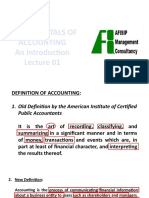100%(1)100% found this document useful (1 vote)
75 viewsTrue Lessons of Recession
True Lessons of Recession
Uploaded by
Gowtham PallekondaThe document summarizes Raghuram Rajan's views on the lessons of the global recession. It argues that the conventional view of simply spending more and cutting rates ignores underlying problems. Deregulation since the 1970s disrupted the status quo, widening inequality as technology eliminated unskilled jobs. Politicians encouraged lending to the lower middle class, abetted by low rates, fueling a housing bubble. Lastly, it says the US must invest in skills while Europe must reduce protections and jobs to address flaws revealed by the recession.
Copyright:
© All Rights Reserved
Available Formats
Download as PPTX, PDF, TXT or read online from Scribd
True Lessons of Recession
True Lessons of Recession
Uploaded by
Gowtham Pallekonda100%(1)100% found this document useful (1 vote)
75 views8 pagesThe document summarizes Raghuram Rajan's views on the lessons of the global recession. It argues that the conventional view of simply spending more and cutting rates ignores underlying problems. Deregulation since the 1970s disrupted the status quo, widening inequality as technology eliminated unskilled jobs. Politicians encouraged lending to the lower middle class, abetted by low rates, fueling a housing bubble. Lastly, it says the US must invest in skills while Europe must reduce protections and jobs to address flaws revealed by the recession.
Original Description:
True Lessons of Recession
Copyright
© © All Rights Reserved
Available Formats
PPTX, PDF, TXT or read online from Scribd
Share this document
Did you find this document useful?
Is this content inappropriate?
The document summarizes Raghuram Rajan's views on the lessons of the global recession. It argues that the conventional view of simply spending more and cutting rates ignores underlying problems. Deregulation since the 1970s disrupted the status quo, widening inequality as technology eliminated unskilled jobs. Politicians encouraged lending to the lower middle class, abetted by low rates, fueling a housing bubble. Lastly, it says the US must invest in skills while Europe must reduce protections and jobs to address flaws revealed by the recession.
Copyright:
© All Rights Reserved
Available Formats
Download as PPTX, PDF, TXT or read online from Scribd
Download as pptx, pdf, or txt
100%(1)100% found this document useful (1 vote)
75 views8 pagesTrue Lessons of Recession
True Lessons of Recession
Uploaded by
Gowtham PallekondaThe document summarizes Raghuram Rajan's views on the lessons of the global recession. It argues that the conventional view of simply spending more and cutting rates ignores underlying problems. Deregulation since the 1970s disrupted the status quo, widening inequality as technology eliminated unskilled jobs. Politicians encouraged lending to the lower middle class, abetted by low rates, fueling a housing bubble. Lastly, it says the US must invest in skills while Europe must reduce protections and jobs to address flaws revealed by the recession.
Copyright:
© All Rights Reserved
Available Formats
Download as PPTX, PDF, TXT or read online from Scribd
Download as pptx, pdf, or txt
You are on page 1of 8
THE TRUE LESSONS OF THE RECESSION
The West Cant Borrow and Spend Its Way to Recovery
ByRaghuram G. Rajan
SCOPE
Conventional Interpretation of Global Recession
The End of Easy Growth
Disrupting the Status Quo
The Politicians Respond
What Can be Done?
CONVENTIONAL INTERPRETATION OF GLOBAL
RECESSION
Growth stalled :
Demand collapsed and accumulated Debt.
The standard Keynesian line, modified for a debt crisis :
Governments that still can should run up even larger
deficits, and central banks should push interest rates
even lower to encourage thrifty households to buy rather
than save
THE END OF EASY GROWTH
The 1950s - 1960s :Time of rapid economic expansion.
1970s: Standstill of rapid growth:
o Unemployment and Inflation
o OPEC increasing Oil prices
UK and US :Deregulation of many industries, such as aviation,
electric power, trucking, and finance.
Europe: Cosmetic reforms, partial deregulation.
DISRUPTING THE STATUS QUO
Effects of Deregulation: Mixed bag
o Cheap Goods for consumers.
o Increase the difference between rich and poor.
o ever-widening income gap on skewed corporate incentives
and misguided tax policies.
Upgrade in technology led to unemployment of unskilled labor.
1980s - 1990s : Dismantling of regulations and trade barriers
put an end to this cozy life.
QUOTE: INCOME & EQUALITY
The difference between median incomes and incomes of
the bottom ten percent has barely budged. The top is
running away from the middle, and the middle is merging
with the bottom
- Raghuram Rajan
(The True Lessons of The Recession)
THE POLITICIANS RESPOND
U.S. leaders encouraged the financial sector to lend more to
lower-middle-class.
Inequality in Spending vs. Earning rose.
The Federal Reserve abetted these shortsighted policies.
In 2001, in response to the dot-com bust, the Fed cut short-term
interest rates
o Expansion in housing construction and created jobs
for unskilled labor.
WHAT CAN BE DONE?
Address the underlying flaws -
1. For US:
o Educating or retraining the workers.(Skilled labor)
o Encouraging Entrepreneurship and Innovation.
o Harnessing the power of the financial sector
2. In Europe:
o Removing the regulations that protect firms and workers
from competition.
o Expanding government's presence.
o Eliminating unnecessary, unproductive jobs.
You might also like
- Directors Director Sidney Weinberg Sept 1955 New Yorker PDFDocument5 pagesDirectors Director Sidney Weinberg Sept 1955 New Yorker PDFwestelm12No ratings yet
- Disturbing The UniverseDocument3 pagesDisturbing The UniverseSally MoremNo ratings yet
- 1 Economic Influences 2021Document69 pages1 Economic Influences 2021akshatNo ratings yet
- The Crawl SpaceDocument12 pagesThe Crawl Spacechitic ioana100% (1)
- The Tyranny of PrintersDocument539 pagesThe Tyranny of PrintersYana Adamovic100% (2)
- MDP Case-TemplateDocument2 pagesMDP Case-Templatekarol lnNo ratings yet
- Strange GlowDocument1 pageStrange GlowgerogeNo ratings yet
- Biological Psychiatry Is There Any Other Kind Samuel B. Guze 1989Document9 pagesBiological Psychiatry Is There Any Other Kind Samuel B. Guze 1989Liam Jacque Lapuz100% (1)
- Dawkins and Biological DeterminismDocument4 pagesDawkins and Biological Determinismdennistrillo100% (1)
- Copenhagen Interpretation - WikipediaDocument12 pagesCopenhagen Interpretation - WikipediaYn Foan100% (1)
- Catalog NYRBSprg2013Document13 pagesCatalog NYRBSprg2013lercheNo ratings yet
- Albert EinsteinDocument190 pagesAlbert EinsteinlaviniandaNo ratings yet
- A New Small-Bodied Hominin From The Late Pleistocene of Flores, Indonesia - Article - NatureDocument11 pagesA New Small-Bodied Hominin From The Late Pleistocene of Flores, Indonesia - Article - Naturedbenit100% (1)
- Goldberg, Stanley (Auth.) Glick, Thomas F. (Eds.) - The Comparative Reception of Relativity (1987, Springer Netherlands) PDFDocument418 pagesGoldberg, Stanley (Auth.) Glick, Thomas F. (Eds.) - The Comparative Reception of Relativity (1987, Springer Netherlands) PDFArtur P. CoelhoNo ratings yet
- Michael Shermer - HAVE ARCHETYPE - WILL TRAVEL : THE JORDAN PETERSON PHENOMENONDocument16 pagesMichael Shermer - HAVE ARCHETYPE - WILL TRAVEL : THE JORDAN PETERSON PHENOMENONFabián Barba100% (1)
- Chronology of EnglandDocument2 pagesChronology of EnglandovikbasuNo ratings yet
- Letter From Iwo JimaDocument2 pagesLetter From Iwo JimapicupiNo ratings yet
- Central Banks As Agents of Economic DevelopmentDocument24 pagesCentral Banks As Agents of Economic DevelopmentFatima AhmedNo ratings yet
- Why Do Things Fall? How To Explain Why Gravity Is Not A ForceDocument17 pagesWhy Do Things Fall? How To Explain Why Gravity Is Not A ForceSains Sekolah RendahNo ratings yet
- The Spandrels of San Marco and The Pang PDFDocument7 pagesThe Spandrels of San Marco and The Pang PDFSebastián LomelíNo ratings yet
- SkininkerDocument69 pagesSkininkerLuis S Alvarez JrNo ratings yet
- Jaynes Gibbs BoltzmannDocument9 pagesJaynes Gibbs BoltzmannYos ShalevNo ratings yet
- BRUCE ACKERMAN - The Emergency ConstitutionDocument65 pagesBRUCE ACKERMAN - The Emergency ConstitutionPaulim7FlexasNo ratings yet
- Australian Cartoonists' Caricatures of Women PoliticiansDocument23 pagesAustralian Cartoonists' Caricatures of Women PoliticiansJuan Ramón MoraNo ratings yet
- Life of James Clerk Maxwell - Lewis Campbell - 1882Document354 pagesLife of James Clerk Maxwell - Lewis Campbell - 1882Clark Xingzhi ZhangNo ratings yet
- Wheeler's Delayed-Choice Gedanken Experiment With A Single AtomDocument5 pagesWheeler's Delayed-Choice Gedanken Experiment With A Single AtomZivko MirkovicNo ratings yet
- Braitenberg, Valentino - Vehicles (1984)Document164 pagesBraitenberg, Valentino - Vehicles (1984)Gabriel CeriniNo ratings yet
- Friedman, Schwartz - A Monetary History of The United StatesDocument61 pagesFriedman, Schwartz - A Monetary History of The United StatesWashington Quintero MontañoNo ratings yet
- FRAME Risk Calculation and Fire SafetyDocument11 pagesFRAME Risk Calculation and Fire SafetyxaviNo ratings yet
- Tarzan of the Apes (Serapis Classics)From EverandTarzan of the Apes (Serapis Classics)Rating: 5 out of 5 stars5/5 (1)
- Cavity MagnetronDocument11 pagesCavity MagnetronIvanPerletaNo ratings yet
- Inflation Is TheftDocument201 pagesInflation Is Theftduasatupolos100% (1)
- History of AnimationDocument7 pagesHistory of Animationhamid100% (1)
- UntitledDocument96 pagesUntitledMuhammad Shahan HussainNo ratings yet
- World History GlossaryDocument105 pagesWorld History Glossaryapi-61564198No ratings yet
- Arts Research (Artists)Document25 pagesArts Research (Artists)Louis Gen FloresNo ratings yet
- Knickerbocker's History of New York: From the Beginning of the World to the End of the Dutch Dynasty (Classic Unabridged Edition): From the Prolific American ... Columbus and The Legend of Sleepy HollowFrom EverandKnickerbocker's History of New York: From the Beginning of the World to the End of the Dutch Dynasty (Classic Unabridged Edition): From the Prolific American ... Columbus and The Legend of Sleepy HollowNo ratings yet
- Ordinary Differential Equations With Applications (Sze-Bi Hsu) (Z-Library)Document307 pagesOrdinary Differential Equations With Applications (Sze-Bi Hsu) (Z-Library)123 abcNo ratings yet
- Books of The CenturyDocument101 pagesBooks of The CenturyOussama OussamaNo ratings yet
- Who's A Pretty Boy Then? or Beauty Contests, Rationality and Greater FoolsDocument16 pagesWho's A Pretty Boy Then? or Beauty Contests, Rationality and Greater FoolsOld School ValueNo ratings yet
- Jerry Falwell's Christian Army - The New YorkerDocument98 pagesJerry Falwell's Christian Army - The New YorkerDaniel PeresNo ratings yet
- ADocument150 pagesAVicente H. MartínezNo ratings yet
- Summary of Marc Levinson's The Great A&P And The Struggle For Small Business In AmericaFrom EverandSummary of Marc Levinson's The Great A&P And The Struggle For Small Business In AmericaNo ratings yet
- Chris RiddellDocument7 pagesChris RiddelloscarletharaNo ratings yet
- Benn Michaels Walter Knapp Steven Against Theory 2 Hermeneutics and DeconstructionDocument20 pagesBenn Michaels Walter Knapp Steven Against Theory 2 Hermeneutics and Deconstructionpain666killerNo ratings yet
- The vignette as an exercise in perception / Η βινιέτα ως άσκηση αντίληψης: On the professionalisation of educational practices / Μία προσέγγιση για την επαγγελματοποίηση της παιδαγωγικής δράσηςFrom EverandThe vignette as an exercise in perception / Η βινιέτα ως άσκηση αντίληψης: On the professionalisation of educational practices / Μία προσέγγιση για την επαγγελματοποίηση της παιδαγωγικής δράσηςNo ratings yet
- Niall Ferguson Is Full of Shit With No Friggin Facts To Back Up His BsDocument9 pagesNiall Ferguson Is Full of Shit With No Friggin Facts To Back Up His Bsmsf3153840% (5)
- A Modest Proposal...: .. to solve the Palestine-Israel ConflictFrom EverandA Modest Proposal...: .. to solve the Palestine-Israel ConflictNo ratings yet
- Freedom Manifesto - Liberal Democrats - NSW 2023 - V7.5Document10 pagesFreedom Manifesto - Liberal Democrats - NSW 2023 - V7.5Michael SmithNo ratings yet
- Thomas S. KuhnDocument33 pagesThomas S. KuhnRafael RoaNo ratings yet
- How Central Banks (And Even Keynes) Misled The Public About Banking and MoneyDocument4 pagesHow Central Banks (And Even Keynes) Misled The Public About Banking and MoneytravNo ratings yet
- Classical Theory of Electricity and Magnetism: Amal Kumar RaychaudhuriDocument302 pagesClassical Theory of Electricity and Magnetism: Amal Kumar RaychaudhuriOtto ResnikovNo ratings yet
- Trending Topics Part 1 of 10 PrelimsDocument45 pagesTrending Topics Part 1 of 10 PrelimsSukant MakhijaNo ratings yet
- My Journey To RBI - Naveen KarthikDocument7 pagesMy Journey To RBI - Naveen KarthikGowtham Pallekonda100% (2)
- SBI PO Interview Capsule 2016Document45 pagesSBI PO Interview Capsule 2016Manvendra SinghNo ratings yet
- Gowtham Resume SampleDocument3 pagesGowtham Resume SampleGowtham PallekondaNo ratings yet
- pp30Document17 pagespp30Aslina AzibNo ratings yet
- Lalicon v. NHADocument5 pagesLalicon v. NHAVeraNataaNo ratings yet
- PhonePe Statement Feb2024 Mar2024Document10 pagesPhonePe Statement Feb2024 Mar2024kpgaming12345678No ratings yet
- (Mirae Asset Sekuritas Indonesia) Flash Focus - SDocument2 pages(Mirae Asset Sekuritas Indonesia) Flash Focus - SFelicia DewiNo ratings yet
- Sale by DescriptionDocument2 pagesSale by DescriptionCamie YoungNo ratings yet
- CV Bagus Dwi PrakosoDocument2 pagesCV Bagus Dwi PrakosoRio Mandala WangiNo ratings yet
- Export CreditDocument3 pagesExport CreditVikas PandeyNo ratings yet
- Export Import UK Details Fundamental 9 Nov 14Document89 pagesExport Import UK Details Fundamental 9 Nov 14sa_mehediNo ratings yet
- Income Tax Department: Computerized Payment Receipt (CPR - It)Document1 pageIncome Tax Department: Computerized Payment Receipt (CPR - It)Mian EnterprisesNo ratings yet
- Financial Rehabilitation and Insolvency Act of 2010 (RA 10142)Document27 pagesFinancial Rehabilitation and Insolvency Act of 2010 (RA 10142)NIKKA C MARCELONo ratings yet
- Micro Finance in Rural IndiaDocument20 pagesMicro Finance in Rural IndiaMinhaj KhurshidNo ratings yet
- Income From Other Sources.: Vaibhav N BanjanDocument21 pagesIncome From Other Sources.: Vaibhav N BanjanPiyush MittalNo ratings yet
- Appellants' Designation of Items To Be Included in The Record On Appeal and Statement of Issues To Be PresentedDocument6 pagesAppellants' Designation of Items To Be Included in The Record On Appeal and Statement of Issues To Be PresentedChapter 11 DocketsNo ratings yet
- Green Shoe Option: A Price Stabilization MechanismDocument15 pagesGreen Shoe Option: A Price Stabilization MechanismvbhvarwlNo ratings yet
- ISO 20022 - Universal Financial Industry Message Scheme: February 2021 Version 6.7 - Approved VersionDocument89 pagesISO 20022 - Universal Financial Industry Message Scheme: February 2021 Version 6.7 - Approved VersionPrasannaNo ratings yet
- Trabsmission Line Bid Document Khuppi To TawangDocument776 pagesTrabsmission Line Bid Document Khuppi To Tawangsauravkafle1No ratings yet
- Fundamentals of Accounting An IntroductionDocument20 pagesFundamentals of Accounting An IntroductionjomarNo ratings yet
- Elliot Lake Community ProfileDocument8 pagesElliot Lake Community ProfileElliot Lake Centre for DevelopmentNo ratings yet
- Glo-Bus Team PresentationDocument20 pagesGlo-Bus Team PresentationMyra100% (7)
- Lesson 4 LectureDocument12 pagesLesson 4 LectureAlex GremoryNo ratings yet
- Ama Mega File-5Document92 pagesAma Mega File-5Ridda BatulNo ratings yet
- FAR - 2017 AICPA Released Questions PDFDocument61 pagesFAR - 2017 AICPA Released Questions PDFAhmed50% (2)
- Ecuador Visa Info DCDocument5 pagesEcuador Visa Info DCMihalis AristidouNo ratings yet
- sf1150 Record of Leave DataDocument2 pagessf1150 Record of Leave DataMark CheneyNo ratings yet
- The Agency Problem and Solution in Corporate WorldDocument16 pagesThe Agency Problem and Solution in Corporate Worldmusfiqur rahmanNo ratings yet
- Exercise CH 14: This Study Resource Was Shared ViaDocument9 pagesExercise CH 14: This Study Resource Was Shared Vianaura syahdaNo ratings yet
- RFPDocument9 pagesRFPSanjayThakkarNo ratings yet
- 2014 Giaa - Consol - 30062014Document145 pages2014 Giaa - Consol - 30062014yukeNo ratings yet





























































































